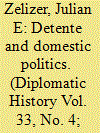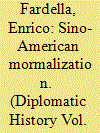| Srl | Item |
| 1 |
ID:
090662


|
|
|
|
|
| Publication |
2009.
|
| Summary/Abstract |
During the first half of the 1970s, Presidents Richard Nixon and Gerald Ford responded to the aftermath of Vietnam by avoiding the extremes of the era: massive military retrenchment (left) and massive military escalation (right). The presidents had different reasons for seeking a centrist national security agenda. The Republican presidents were willing to accept and actively pursue arms and trade agreements with the Soviet Union and China. Nixon concluded that appealing to moderates was essential in order to protect a muscular national security state from retrenchment in the aftermath of the 1960s and to ensure his own electoral success. His successor, Gerald Ford, believed that détente with the Soviets could rebuild public confidence in the post-Watergate GOP.
|
|
|
|
|
|
|
|
|
|
|
|
|
|
|
|
| 2 |
ID:
090658


|
|
|
|
|
| Publication |
2009.
|
| Summary/Abstract |
Brzezinski preferred to divide Sino-American relations into three parts-bilateral relations, common strategic interests focused on the Soviet threat, and normalization-and he wanted to pursue each on a separate track. He agreed with Vance that progress towards normalization would require a compromise on the future status of Taiwan, but he argued that the Chinese might be less strident on the issue if they became convinced that closer relations with the United States would enhance their own security vis-à-vis the Soviets. In any event, Brzezinski believed that the Chinese were sufficiently concerned about the Soviet threat, that they were interested in ways that the United States might be used to offset that threat, that mutually beneficial relations in some areas could progress ahead of the normalization process if necessary. In that context, he was eager to demonstrate progress in Sino-American relations in part as a signal to the Soviets to help them understand the value of "restraint and reciprocity
|
|
|
|
|
|
|
|
|
|
|
|
|
|
|
|
| 3 |
ID:
090664


|
|
|
|
|
| Publication |
2009.
|
| Summary/Abstract |
This article focuses primarily on the nuclear relationship between the two countries with specific emphasis placed on the U.S.-Soviet Agreement on the Prevention of Nuclear War, signed in Washington between President Richard Nixon and General Secretary Leonid Brezhnev on June 22, 1973. Known by the British as "Operation Hullabaloo," and conducted in great secrecy, Britain's involvement was significantly greater than acknowledged at the time. Far from being bit players lurking in the wings of the Cold War, British officials were integral to the negotiations and largely responsible for drafting the treaty. But the dictates imposed in maintaining an exclusive bilateral relationship with Washington were often at variance with the need to develop a European security identity.
|
|
|
|
|
|
|
|
|
|
|
|
|
|
|
|
| 4 |
ID:
090657


|
|
|
|
|
| Publication |
2009.
|
| Summary/Abstract |
The diplomatic normalization between the United States and the PRC may certainly by considered one of the most important events in the development of the Cold War in Asia as well as in the world. Its historical meaning transcends the simple diplomatic recognition between two countries: it war a crucial tactical element in a much wider strategic plan outlined by the convergence of Beijing's and Washington's national interests in the second half of the 1970s.
|
|
|
|
|
|
|
|
|
|
|
|
|
|
|
|